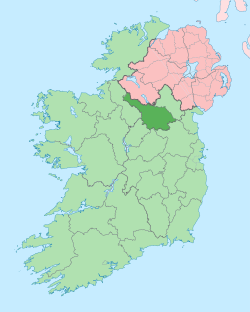Greagh
Greagh (from Irish: Gréach meaning 'a Moor or flat bog') is a townland in the civil parish of Templeport, County Cavan, Ireland. It lies in the Roman Catholic parish of Templeport and barony of Tullyhaw.
Geography
Greagh is bounded on the north by Ballymagirril townland, on the west by Sraloaghan and Leckan townlands in County Leitrim, on the south by Lislahy and Knocks townlands in County Leitrim and on the east by Cornagunleog townland. Its chief geographical features are a wood and spring wells. Greagh is traversed by minor roads and rural lanes. The townland covers 142 statute acres.[1]
History
Until the 19th century Greagh formed part of the modern townland of Ballymagirril, so its history is the same until then.
The Greagh Valuation Office Field books are available for October 1839.[2]
In 1841 the population of the townland was 59, being 29 males and 30 females. There were eleven houses in the townland, and all were inhabited.[3]
In 1851 the population of the townland was 25, being 9 males and 16 females, the reduction being due to the Great Famine (Ireland). There were six houses in the townland and all were inhabited.[3]
Griffith's Valuation of 1857 lists six landholders in the townland.[4]
In 1861 the population of the townland was 26, being 13 males and 13 females. There were four houses in the townland, of which two were uninhabited.[5]
In 1871 the population of the townland was 13, being 7 males and 6 females. There were three houses in the townland, and all were inhabited.[6]
In 1881 the population of the townland was 16, being 8 males and 8 females. There were four houses in the townland, of which one was uninhabited.[7]
In 1891 the population of the townland was 22, being 8 males and 14 females. There were four houses in the townland, all were inhabited.[8]
In the 1901 census of Ireland, there are four families listed in the townland, [9] and in the 1911 census of Ireland, there are only three families listed in the townland.[10]
Antiquities
There don't seem to be any structures of historical interest in the townland.
References
- "IreAtlas". Retrieved 29 February 2012.
- Commons, Great Britain Parliament House of (April 11, 1853). "Accounts and Papers of the House of Commons". Ordered to be printed – via Google Books.
- "Griffith's Valuation". askaboutireland.ie. Retrieved 16 April 2016.
- "Census of Ireland 1881 : Area, Population and Number of Houses; Occupations, Religion and Education volume III, Province of Ulster". HMSO. April 11, 1882 – via Internet Archive.
- "HISTPOP.ORG - Website too busy". www.histpop.org.
- "National Archives: Census of Ireland 1901". census.nationalarchives.ie. Retrieved 16 April 2016.
- "National Archives: Census of Ireland 1911". census.nationalarchives.ie. Retrieved 16 April 2016.
